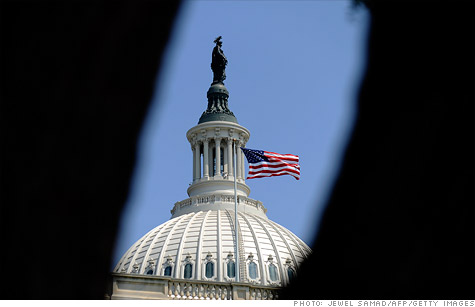Search News

Both debt ceiling bills in Congress would cut about $25 billion next year - at a time when the economy is sluggish.
NEW YORK (CNNMoney) -- If the debt ceiling goes up, government spending is most likely going down.
And with the economy grinding to a halt, the timing couldn't be worse.
Lawmakers are still working out the details -- to put it kindly -- but it now appears that the government will be spending $25 billion less in fiscal year 2012.
The two bills that could serve as a framework of a deal contain about the same level of cuts in the first year, according to the Congressional Budget Office.
The cuts will start helping to get the nation's debt on a sustainable track. But will they hit the economy at a particularly bad time?
The unemployment rate stands at 9.2%. The government jobs reports for May and June were dismal. The housing market is not exactly vibrant. In fact, it's terrible.
And on Friday, the government reported that consumers all but shut their wallets in the second quarter, and GDP rose at an annual rate of only 1.3%. On top of that, growth was a paltry 0.4% in the first three months of the year, the government said.
At the same time, the Fed has taken its foot off the gas and stopped its bond-buying program. Recovery Act funds are dried up. And next year, unemployment benefits and the payroll tax holiday will expire.
In other words, the economic stimulus the government deployed in an attempt to get the economy back on track are all but gone. And now, spending cuts are on the way.
"The economic indicators are pretty disturbing in light of the fact that policy is going in the opposite direction of a normal response to an economic slowdown," said Chad Stone, chief economist at the Center on Budget and Policy Priorities.
If lawmakers were to follow conventional economic models, they would actually increase federal spending to spur growth and make up for the lack of demand in the marketplace.
"Conventional mainstream economic analysis says when you have an economy like this one ... the thing you do is provide additional monetary and fiscal stimulus," Stone said.
But Pierre Ellis, a senior economist at Decision Economics, said the cuts would probably have a moderate impact because they are relatively small.
But, he added, they still have the potential to be one additional drag on an economy with a whole host of problems.
"The cuts are not that big," Stone said "But it's the straw that could break the camel's back."
While initially small, the cuts will increase in size over the course of a decade, eventually totaling near $1 trillion.
They will hit non-security discretionary spending hardest, a small section of the budget that includes funding for food inspectors, the FBI and education grants, among many other programs and services people associate with government.
Obama said earlier this month that the 2009 Recovery Act has already provided a glimpse into a future filled with spending cuts.
"We've seen that federal support for states diminish, you've seen the biggest jobs losses in the public sector -- teachers, police officers, firefighters losing their jobs," Obama said during a press conference. ![]()
| Overnight Avg Rate | Latest | Change | Last Week |
|---|---|---|---|
| 30 yr fixed | 3.80% | 3.88% | |
| 15 yr fixed | 3.20% | 3.23% | |
| 5/1 ARM | 3.84% | 3.88% | |
| 30 yr refi | 3.82% | 3.93% | |
| 15 yr refi | 3.20% | 3.23% |
Today's featured rates:
| Latest Report | Next Update |
|---|---|
| Home prices | Aug 28 |
| Consumer confidence | Aug 28 |
| GDP | Aug 29 |
| Manufacturing (ISM) | Sept 4 |
| Jobs | Sept 7 |
| Inflation (CPI) | Sept 14 |
| Retail sales | Sept 14 |